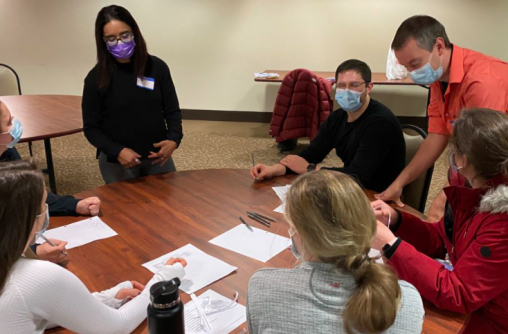Excerpt

Wright State University Boonshoft School of Medicine OB-GYN residents participate in an anti-racism dialog session in February.
A group of Dayton doctors early in their careers are piloting an anti-racism dialogue training never before applied to the field of medicine.
The program offered to the Wright State University OB-GYN residents for the past year will soon be expanded to include Boonshoft School of Medicine administration and eventually faculty, other medical residents and students.
The training facilitators hope the program expands beyond Wright State someday and helps as many doctors as possible grapple with their biases.
The Dayton Daily News Path Forward project investigates the most pressing issues facing our community, including race and equity.
Black and minority people in the Miami Valley and the country have poorer health outcomes on average, including higher rates of maternal and infant mortality and shorter life expectancies. The racist biases, unintentional and intentional, among health care professionals likely contribute to that.
The long-term goal of this training is to create more equitable treatment and outcomes for patients, said Dr. David Dhanraj, chair of the Department of Obstetrics and Gynecology at the Boonshoft School of Medicine.
“If we create a group of (doctors) who have the ability to listen and to relate and to build trust and relationships, I truly believe that’s what the answer is,” he said. “This is the first step on a thousand-mile journey.”
Dhanraj said this training goes beyond “checking a box.”
 Dr. Keith Reisinger-Kindle instituted the dialog sessions when he took over as the assistant OB-GYN residency program director this past academic year. Once a month for the past eight months, he and Dr. Tasha Faruqui, a pediatrician from Cincinnati, have facilitated dialogue sessions lasting one to two hours using a method developed by the University of Michigan. The residents are not required to come, but all 24 of them have attended at least one session, Reisinger-Kindle said.
Dr. Keith Reisinger-Kindle instituted the dialog sessions when he took over as the assistant OB-GYN residency program director this past academic year. Once a month for the past eight months, he and Dr. Tasha Faruqui, a pediatrician from Cincinnati, have facilitated dialogue sessions lasting one to two hours using a method developed by the University of Michigan. The residents are not required to come, but all 24 of them have attended at least one session, Reisinger-Kindle said.
“It speaks volumes they keep investing their limited free time in this initiative,” he said. “It speaks not only to the need but the desire to be better, the desire to be more informed, to be more participatory in the care that they give patients.”
During the sessions, participants dig deep into their own experiences with race and other identities — such as disability, gender, sexual orientation — often through discussion and “interactive puzzles.”
“It’s really not telling people how to be, it’s really just challenging people in a safe way to really learn about multiple social identities and how that can apply to not only medicine but really just living life,” Faruqui said. “I really think that we have to kind of open our eyes to the everyday experiences before providers themselves can really identify the biases in health care.”
Dr. Zachary Candela, a third-year OB-GYN resident, said the program has taught him a lot about how to be mindful of a patient’s background.
“It’s just really given me a lot of perspective on how to engage with patients that may not look like myself,” said Candela, who is white.
Reisinger-Kindle said this is not implicit bias training.
“(In medicine we often act like) if you check a box and take one training session, then you’re no longer racist, you’re automatically an ally and you get it,” he said. “But our biases, as white people in particular, always exist with us and we cannot get rid of them. So it’s more important to me that people understand that they exist and they can’t go away and how to navigate them in the world is the skill that dialogue provides, not removing them per se.”
Wright State University Boonshoft School of Medicine administration is committed to expanding the program, starting with top leadership in the fall, said Dr. Albert Painter, assistant dean for faculty affairs.
“This school has really had a long-term commitment to diversity, equity and inclusion, and we just want to take it one step further,” he said. “The school is very excited about this (initiative).”
Before the training can be rolled out to all faculty and students, more facilitators must be trained and some details need to be decided on, Painter said. Reisinger-Kindle, Faruqui, and Dhanraj have met with Painter and Valerie Weber, dean of the Boonshoft School of Medicine.
“Earlier this year, Gov. DeWine declared ‘racism a public health crisis,’” Weber said in an emailed statement. “Health inequities and disparities have long been a concern of those of us in medical education. We at BSOM are dedicated to training physicians in a learning environment where diversity and inclusion is a core value, and programs such as these help us to live that mission.”
View the original story at daytondailynews.com

 New entrepreneurship center opens at Wright State to help veterans, spouses start, expand businesses
New entrepreneurship center opens at Wright State to help veterans, spouses start, expand businesses  Wright State grad Deah Lieurance to discuss invasive species during Wayne Carmichael Lecture in Environmental Sciences
Wright State grad Deah Lieurance to discuss invasive species during Wayne Carmichael Lecture in Environmental Sciences  Wright State’s Tom Hanks Center for Motion Pictures adds director, plans to grow
Wright State’s Tom Hanks Center for Motion Pictures adds director, plans to grow  Wright State departments create powerful collaboration researching threats to expectant mothers, babies
Wright State departments create powerful collaboration researching threats to expectant mothers, babies  Wright State nursing students to offer Stop the Bleed training in Wilmington
Wright State nursing students to offer Stop the Bleed training in Wilmington 